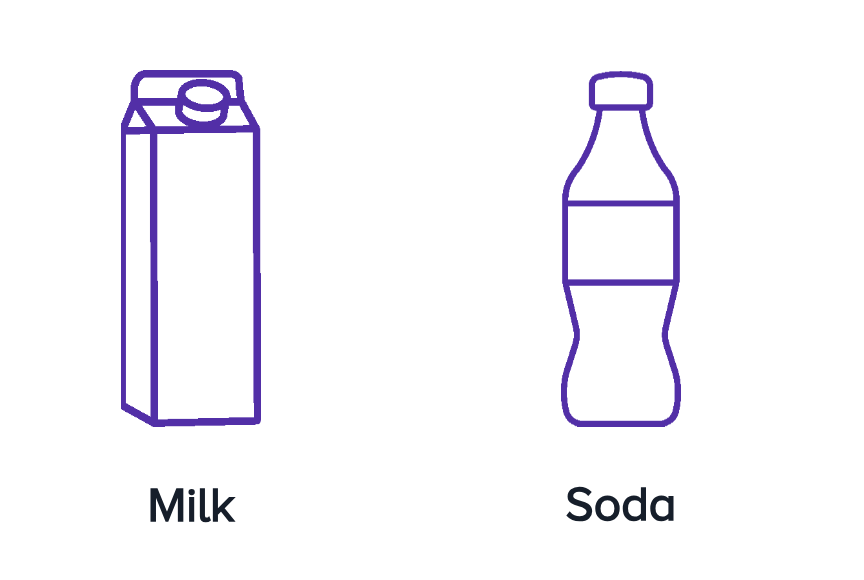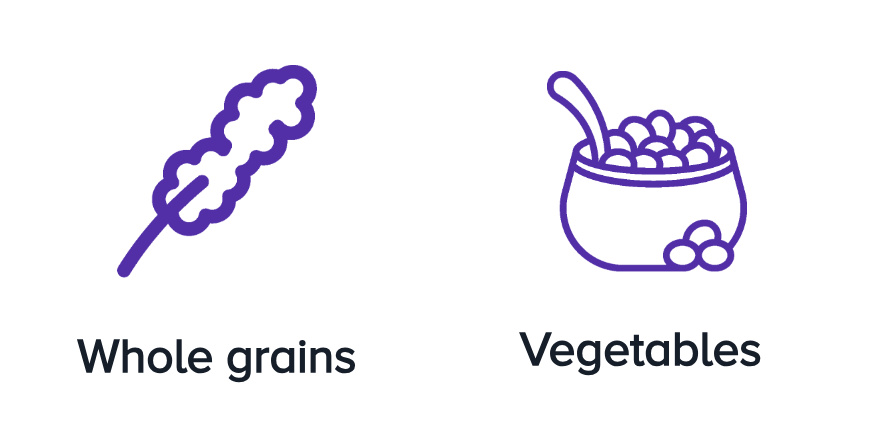
Good Carbs, Bad Carbs: How Carbohydrates Fit Into a Healthy Diet
Jun 30, 2023Are carbs good or bad? Is cutting carbs necessary for my health, or does it do more harm than good? We break down the facts and myths about carbohydrates.
When people talk about getting healthy or eating better, the conversation often turns to carbs. Many popular diet plans revolve around the idea of “carb-cutting” to lose weight or provide other health benefits. But is removing carbs from your diet really the best step to optimize your health and improve your nutrition?
Today, we’re covering what you need to know about carbohydrates - what they are, their purpose in supporting your health, and how to incorporate them into a balanced, nutritious diet.
Good carbs, bad carbs?
Carbohydrates - often shortened to carbs - are a type of macronutrient found in certain foods. Sugar, fiber, and starch are all considered carbohydrates. Carbs play an important role in our diets because they’re one of the body’s primary sources of energy.
To understand the role carbs play in our nutrition, it’s important to recognize that different types of carbohydrates exist. We can break down carbs into two categories: simple carbohydrates and complex carbohydrates. Each of these types have different compositions, are found in different foods, and have different impacts on our nutrition and overall health.
Simple carbohydrates
Simple carbohydrates get their name because they’re easy for our bodies to digest. Sugar, in its various forms (like white sugar and corn syrup), is considered a simple carbohydrate.
Simple carbohydrates are found naturally in foods like milk and fruits. However, when we think of simple carbs in our modern diets, what we’re most often referring to is “junk food” carbs - the kind in processed snacks and packaged desserts. In other words, simple carbohydrates are the “bad carbs” you’ve been warned about.
Because our bodies digest and process simple carbs quickly, eating a diet heavy in this kind of carbohydrate can lead to spikes and crashes in your blood sugar level, as well as increased hunger in between meals.
Examples of Simple Carbohydrates



Complex carbohydrates
On the other hand, complex carbohydrates get their name because our bodies digest them more slowly. Fiber and starch are considered complex carbohydrates.
Complex carbohydrates are found in vegetables, beans, and whole grains. These are the “good” carbs. Because our bodies process and digest them more slowly, including complex carbs in your diet can help you feel full and maintain a more consistent energy level.
Examples of Complex Carbohydrates


Other ways to talk about carbs
In addition to seeing carbohydrates described as “simple” or “complex,” you may see them referred to as “whole carbs” or “refined carbs.”
Whole carbs are found in minimally processed foods, like raw vegetables and quinoa. Refined carbs are found in processed foods, where they may have had natural fiber removed or sugar added. White bread and soda are examples of refined carbs. Generally, refined carbs will fall into the category of simple carbohydrates, while whole carbs will fall into the complex carbohydrate category.
“Good carbs” and “bad carbs”

You may have heard people talk about “good carbs” and “bad carbs.” “Good carbs” are complex carbohydrates. These carbs are beneficial to your diet for a few reasons. Because of their makeup, they help keep your blood sugar levels more consistent and take longer for your body to digest. This means eating complex carbs will help you feel full longer. Complex carbs also tend to be more nutritionally rich foods, as they include a number of vitamins, minerals, and fiber.
“Bad carbs” are simple carbohydrates. Sometimes called “empty carbs,” these foods can cause dramatic spikes and falls in your blood sugar levels, and are digested fairly quickly. This means eating simple carbs can lead to sudden spikes and crashes in your energy level, and you will feel hungry sooner. Simple carbs tend to have very little nutritional value, as they lack the key vitamins and minerals found in complex carbs.
So, when we talk about making carbs a part of a healthy diet, we mean including the type of carbs that provide important nutritional value to your body. To explain further, let’s talk about some misconceptions people have about carbs.
The biggest myths about carbs
If you’re looking to improve your diet and nutrition, you’ve probably heard a lot about carbs already. We’ve already dived into this a bit by addressing the facts behind “good carbs” and “bad carbs.” To take things a step further, we want to debunk some common misconceptions about carbohydrates.
Myth #1: Carbs are just bread and pasta (or just junk food).
As we previously discussed, carbohydrates are a macronutrient that encompass a few different kinds of foods. White bread, pasta, and many junk foods are carbohydrates, so are foods like beans, fruits, and vegetables. Understanding that carbs come in different forms - and have different nutritional value - is important to make the best decisions for your nutrition.
Myth #2: I have to stop eating carbs to lose weight.
A lot of popular diet plans - including Keto, Atkins, South Beach, and some Paleo plans - emphasize carb-cutting as a way to lose weight. But again, the effectiveness of carb-cutting as a weight loss strategy depends on being able to differentiate between nutritional and non-nutritional carbs.
Cutting out refined carbs - like pastries, chips, and soda - can help promote weight loss, while also improving your health in other ways, like reducing your risk for diabetes and cardiovascular disease. However, if you removed all carbs from your diet, you would also be removing all the fiber, vitamins, and other nutrients your body needs from fruits and vegetables.
Myth #3: Early humans didn’t eat carbs, so carbs are unhealthy for us.
While early humans didn’t have Twinkies, they definitely did have carbohydrates in other forms. Our ancestors consumed foods like root vegetables and grains - all forms of carbs.
Myth #4: Eating protein is more important than eating carbs.
Good nutrition is all about variety. You need a balance of all the key macronutrients - carbs, protein, and fat - to keep your body and brain performing their best. We recommend talking to your doctor to come up with a balanced nutrition plan created with your specific lifestyle and medical background in mind.
Myth #5: Carbs are bad for our brains.
Chronic inflammation can contribute to cognitive decline, and certain foods can cause inflammation. Excessive sugar, like the kind found in refined carbohydrates, is considered inflammatory. So, refined carbs can be bad for our brains.
However, the magnesium and fiber in whole grains (whole, complex carbs) work to reduce inflammation. The Mediterranean Diet, for example, is rich in whole grains and has been shown in studies to slow age-related cognitive decline and lower the risk of Alzheimer’s disease.
If you’re concerned about cognitive decline or your general brain health, focus on eating fewer processed, refined carbs and adding more whole grains, leafy greens, and cruciferous vegetables to your diet.
What do carbs do for the body?
Now that we’ve explained the difference between simple and complex carbohydrates, and busted some of the biggest myths about carbs, let’s talk about what carbs actually do for your body and overall nutrition.

Provide energy
While certain diets and lifestyle choices can help train our bodies to rely on other kinds of energy, carbohydrates serve as the body's main source of fuel. When we digest carbs, the sugars and starches are broken down into glucose and absorbed into the bloodstream or stored in the liver for later use.
Protect against disease
Whole grains and dietary fiber can help lower your risk for heart disease and stroke. The balance of vitamins and minerals provided by complex carbs like vegetables can help strengthen your bones, prevent birth defects, boost your immune system, promote a healthy metabolism, and more.
Promote a healthy body weight
While consuming high quantities of simple carbs and refined sugars can lead to weight gain, a diet that emphasizes complex carbs can help you maintain a healthy body weight. Complex carbs leave you feeling full for longer on fewer calories, which can help you reduce your caloric intake and avoid overeating.
5 healthy, carb-conscious diet tips
Carbohydrates play an important role in our overall nutrition. Like anything else we eat, we need to make informed choices about how and when they play a role in our diets.
Here are a few tips to make your diet more “carb-conscious” and nutritious.
1. Quality before quantity
Because cutting carbs has been promoted as a necessity for weight loss and many diet plans for so long, it’s easy to find yourself fixating on the amount of carbs you consume. But it’s much more important to focus on the quality of the carbohydrates you’re eating. Focusing on eating complex carbohydrates instead of simple carbohydrates will improve your overall nutrition, because these carbs are sources of vitamins, minerals, and fiber that your body needs.
How do I do it? Before you try carb cutting, try carb swapping. Replace the simple carbohydrates you’re already eating with complex carbohydrates instead. For example, swap white rice for quinoa, and trade your sugary breakfast cereal for a whole-grain option instead. Next, opt to include more vegetables in your diet. They’re complex carbs that will leave you feeling fuller, while providing you with key nutrients in the form of vitamins, minerals, and fiber.
2. Variety rules
A nutritious diet is a varied diet. If you eat the same foods all the time, that means you're getting the same nutrients all the time. Different foods contain different vitamins and minerals (and no one food contains everything we need to function at our best). So, it's important to shake up what we eat to ensure we're getting the best possible nutrition from our food. Also, it just makes eating a more fun and interesting experience!
How do I do it? Add a little variety to your diet by picking up one new vegetable every time you go grocery shopping. Then, add more variety to your plate by trying to make your meals include as many different colored foods as possible. (Think green kale, red peppers, orange sweet potatoes, yellow squash…)
3. Everything in balance
To optimize our health, we need to consume a balance of the key macronutrients: carbs, protein, and fat. Each plays an important role in making sure our bodies and brains are functioning at their best.
How do I do it? In addition to complex carbs, ensure your diet also includes protein and healthy fats. For animal protein, we recommend skipping red meat and focusing on lean poultry and wild caught fish (low in mercury). For plant-based protein, look to beans, lentils, and chickpeas. (Remember that most vegetables also contain protein, so they're great sources of both protein and complex carbohydrates.)
Much like carbs, fat is something people often think they need to avoid entirely when trying to improve their nutrition. While certain fats (trans fats) are bad for you, healthy fats (unsaturated fats) play an important role in a balanced diet. Nuts, seeds, avocados, and olive oil are examples of healthy fats.
4. Make informed choices
If we want to eat healthy, we have to start by knowing what it is we’re eating. Good news - you’re already on the right path, because now you can identify the different kinds of carbohydrates! When you know how foods affect your body, you can make informed decisions about your health and nutrition.
How do I do it? When grocery shopping, take the time to read the Nutrition Facts labels on your food. This will give you valuable insight into its ingredients and nutritional makeup. Remember, processed foods often contain simple carbs. (You can learn more about identifying simple carbs and hidden sugars in food labels here.) Take things a step further by making an effort to cook more at home. Cooking your own meals gives you greater control over what you eat; plus, home cooked meals have greater nutritional value than eating fast food or microwave dinners.
5. Health is a habit
Finally, a nutritional diet is based on ongoing healthy habits. To maintain your commitment to your health, you want to consistently eliminate unhealthy eating patterns and always look for new ways to make healthier choices. The more you do it, the easier it gets!
How do I do it? Every month, reflect on your diet and come up with one healthier food or eating habit that you want to focus on adding to your nutritional routine. For example, you might try to cut out one specific simple carb, like soda, or one unhealthy habit, like late-night snacking. You could commit to trying a new vegetable every day, or cooking an additional meal at home every week. Whatever you choose, do it for the entire month. Then, add in a new healthy habit to the mix next month!
Finding a support group or another person that also wants to create healthier eating habits can help you on your nutrition journey too. Being accountable to each other goes a long way transform your healthy choices into ongoing habits.
Eat well, live well
You don’t have to be scared of carbs. With the right knowledge, you can be empowered to make nutritional choices that benefit your body and brain. Then, you can turn those nutritional choices into healthy habits to make a long-lasting positive impact on your life. You are what you eat - so eat well to live well.
Want expert advice on eating well for your brain?
Are you looking to revolutionize your nutrition, change your lifestyle, and optimize your cognitive health? If you know it’s time to not just work around your health challenges, but to do something about them, check out NeuroFlow Foundations. We’ll send you new tips and tricks for improving your cognitive health each month, all backed by our years of medical expertise and grounded in our holistic six pillar approach.

